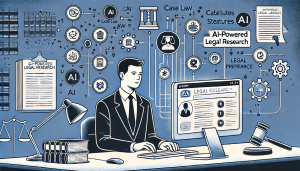 UseCasesFor.ai
UseCasesFor.ai
Choose Topic
 UseCasesFor.ai
UseCasesFor.ai
AI Use Cases
A collection of over 250 uses for artificial intelligence
A continually updated list exploring how different types of AI are used across various industries and AI disciplines,including generative AI use cases, banking AI use cases, AI use cases in healthcare, AI use cases in government, AI use cases in insurance, and more

Sign up
to receive a PDF containing all the use cases and stay updated with the latest AI trends and news (you can always unsubscribe)
Legal research

Introduction
The legal community has for a long time been associated with the strict adherence to the letter of the law and the rule of law, but this field is not exempt from the changes that have come with the new digital age. This has been more so seen in the field of legal research where change has been spearheaded by the use of Artificial Intelligence. Among the technologies that have recently gained popularity in this field, there is the RAG (Regulatory Gen AI). This AI system has been developed to work with large sets of data, to identify relationships and to forecast future events to the best possible level. RAG Gen AI is revolutionalizing the legal research process and creating advanced strategies for solving the problems that have been a standard part of the legal practice.
Challenges
There are however some barriers that have to be addressed in order to realize the prospects that come with the use of AI in legal research. Firstly, legal profession is a highly governed one and any technology that is to be used has to follow the set laws and ethics. Secondly, there is a huge amount of legal information and, therefore, such AI systems have to filter through a large amount of data to find the relevant information. Thirdly, there is the issue of trust since legal professionals may not want to depend on AI for strategic choices, this is because there is lack of clearness and answerability of AI. Fourthly, the integration of AI technology in legal firms is not cheap. Lastly, there is the question of capacity as legal practitioners will require adequate training and skills upgrade to integrate AI in their practice.
AI Solutions
There are certain challenges that modern legal departments face in the course of their work, and AI solutions such as RAG Gen AI are supposed to solve these challenges. RAG Gen AI incorporates machine learning models which aid in the analysis of legal information, pattern recognition, and forecasting. It is capable of filtering large amount of legal information and organize the information that is useful to legal professionals thereby saving on time. Also, it has incorporated natural language processing capabilities that make it easier to use and engage with. In addition, the AI system adheres to all the legal and ethical requirements and its operations can be tracked and checked, thus solving the trust problem. From the cost perspective, AI can in fact decrease expenses in the future as it is capable of performing monotonous tasks and works efficiently. In the area of training, the providers of AI solutions themselves offer training and support to assist legal professionals on how to utilize the technology properly.
Benefits
There are numerous advantages of using AI in legal research. Firstly, it enhances efficiency through the integration of automation in mundane tasks so that legal experts can concentrate on the more challenging aspects of their practice. Secondly, it minimises the chances of errors being made, thus enhancing the precision and reliability of legal research. Thirdly, it enables processing of large data that would not be possible to do so with human efficiency. Fourthly, it may assist in recognizing similarities and sequences in legal information, which might be useful in the formation of legal plans and decisions. Lastly, through decreasing the time and energy used in legal research, AI can also assist in decreasing the costs and enhancing the profitability of legal firms.
Return on Investment
There is a huge ROI when it comes to applying AI in legal research. McKinsey has reported that AI can automate between 22% of a lawyer’s work and 35% of a law clerk’s work, which translates to cost efficiency. In addition, the enhanced efficiency and precision of legal research can yield positive results for clients, and this may in turn improve the status of a firm and open up new opportunities for practice. Also, the intelligence information provided by analyzing legal data can support firms to make right decisions at right time and increase their market share.